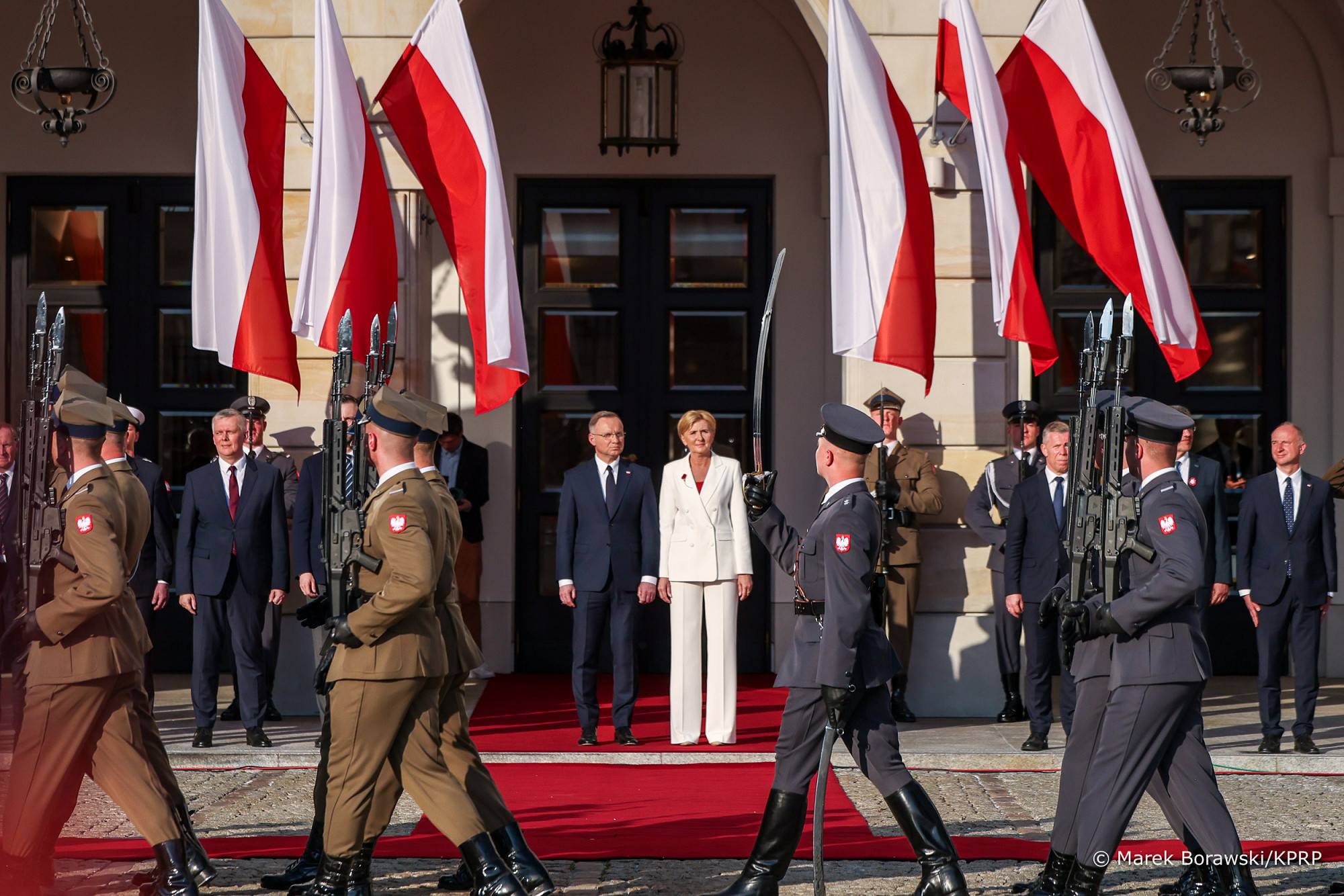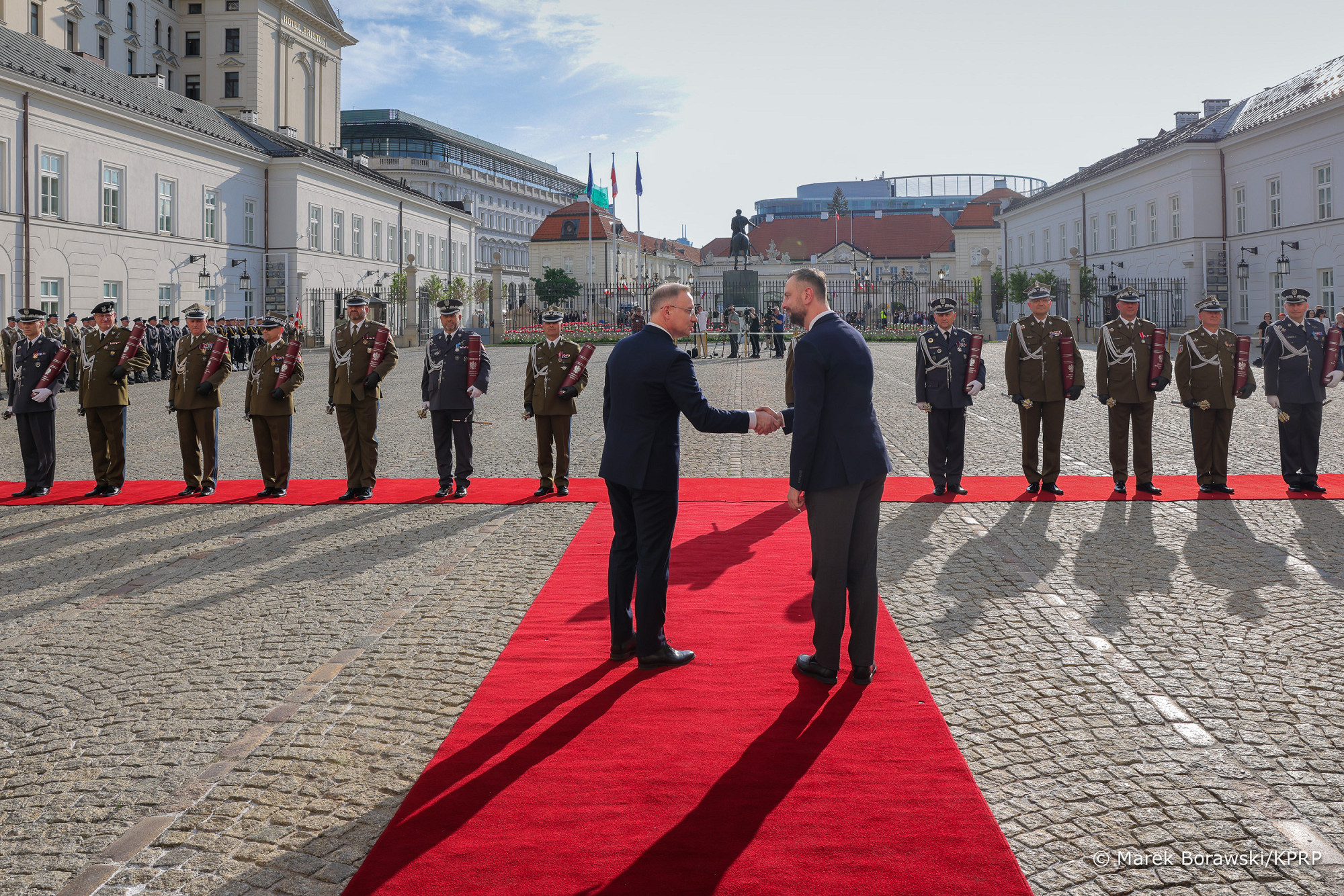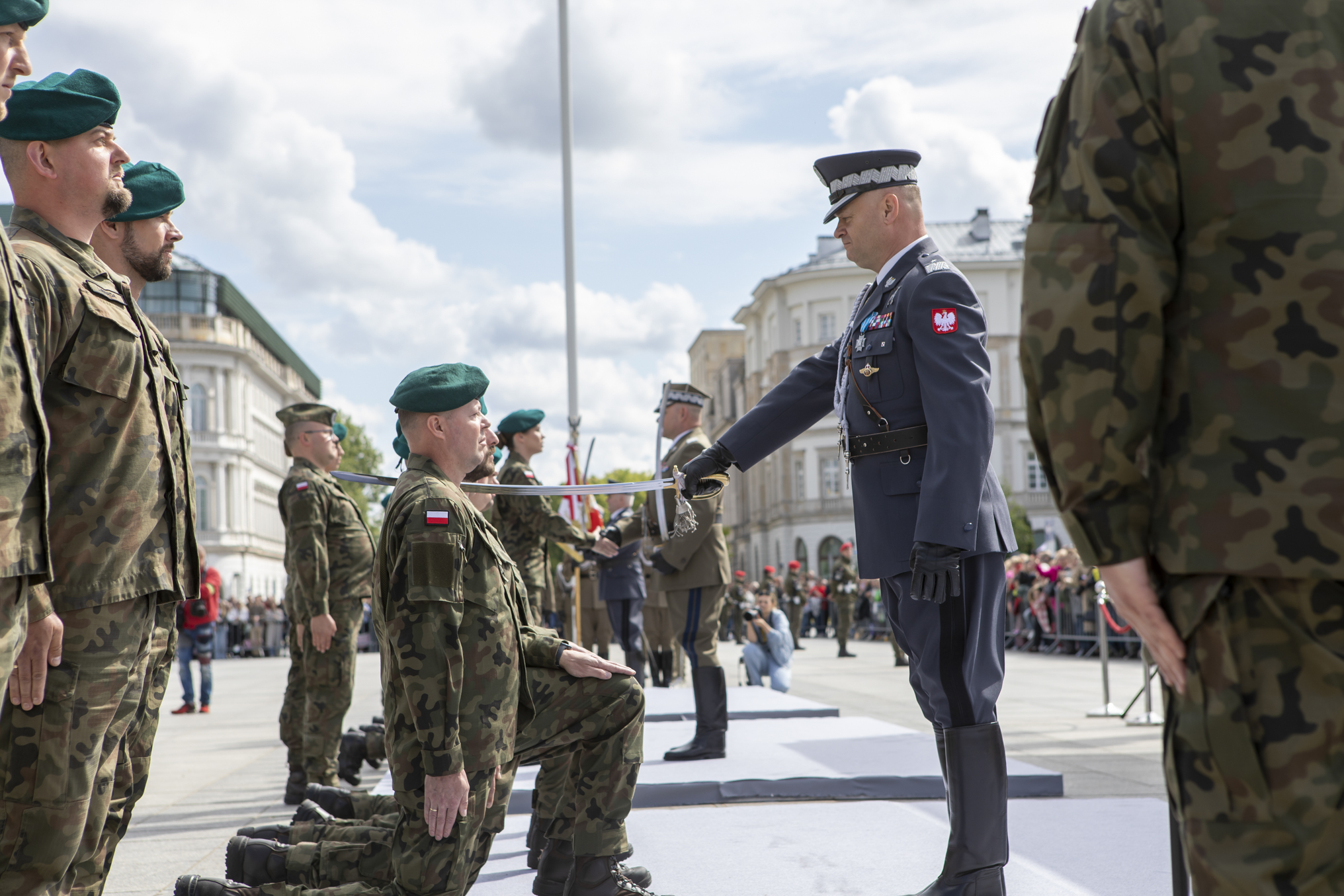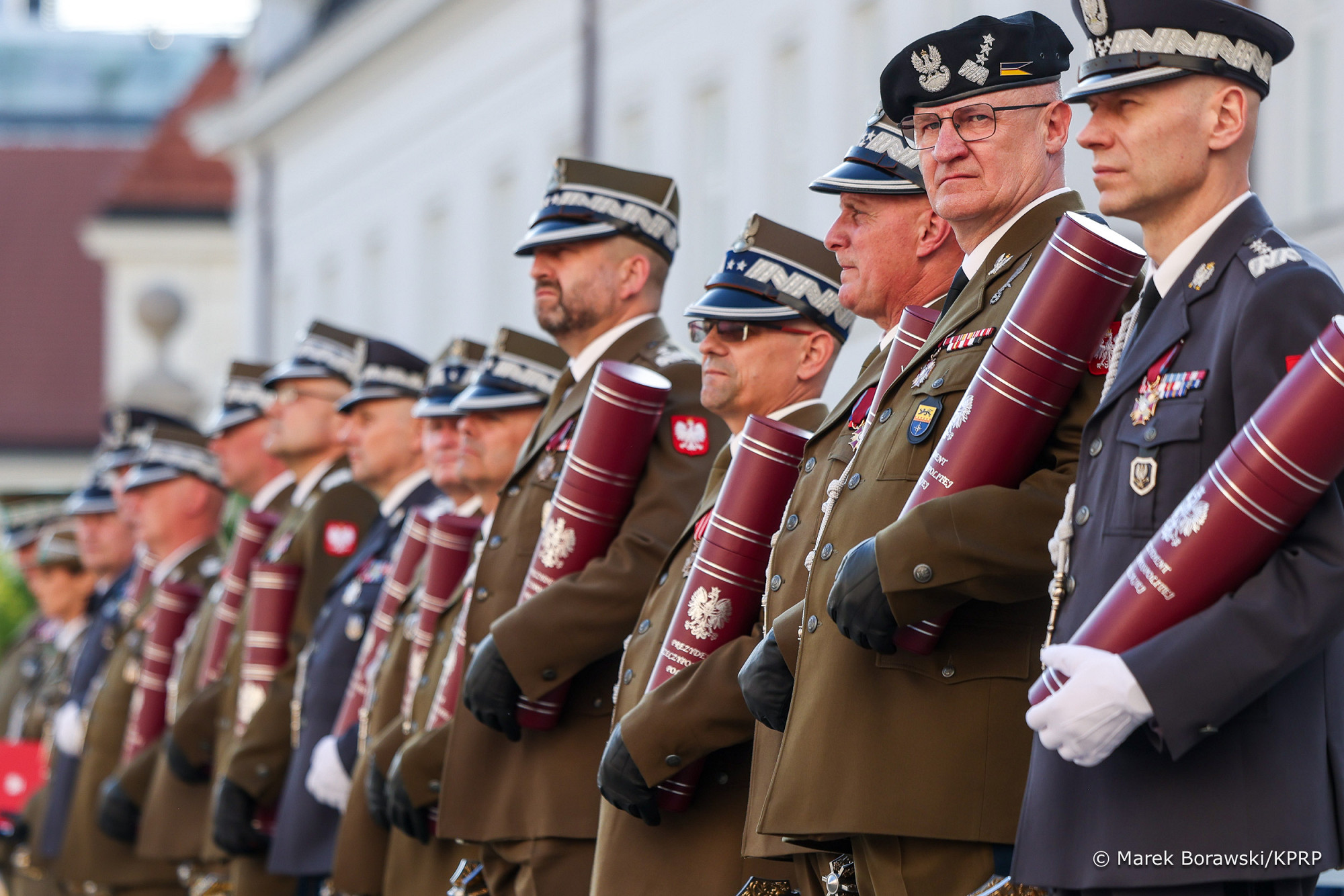We elect the commander-in-chief of the armed forces. How much can the president do in Poland?

- The President is the supreme commander of the Armed Forces of the Republic of Poland.
- The President’s powers in the field of defense are defined by the Constitution and the Defense of the Homeland Act.
- The commander-in-chief of the armed forces must cooperate with the government, the prime minister and the minister of defence.
The president's competences regarding national defense and the military are regulated not only by the 1997 Constitution, but also by laws, the most important of which is currently the Act on the Defense of the Homeland adopted in 2022.
According to the Constitution, the President not only ensures compliance with the Constitution, but also " safeguards the sovereignty and security of the state as well as the inviolability and integrity of its territory ".
The president is also the representative of the state in international relations, and in the field of foreign policy he cooperates with the prime minister and the head of the Ministry of Foreign Affairs . This is not written in any regulation, but in Poland it is a custom that while the prime minister participates in the summits of the European Union , the president goes to the summits of the North Atlantic Alliance ( NATO ), as well as the United Nations.

Chapter five of the Constitution, devoted to the powers of the president, contains 20 more or less extensive articles. As many as three of them concern the army.
The Constitution states that "The President of the Republic of Poland is the supreme commander of the Armed Forces of the Republic of Poland."
At the same time, immediately afterwards the Constitution adds that "in times of peace, the President of the Republic of Poland shall exercise command over the Armed Forces through the Minister of National Defence".
In turn, the Act on the Defense of the Homeland states that the Minister of National Defense "manages the government administration department" called National Defense, as well as the Ministry of National Defense , i.e. "the body through which the President of the Republic of Poland exercises command over the Armed Forces in times of peace."
Authority and managementThe line between authority and management is a matter of dispute between successive presidents and defense ministers. Characteristically, conflicts between politicians holding both positions occurred regardless of the political option they came from. The conflict between President Lech Kaczyński, who ran in the elections as a candidate of Law and Justice , and Minister Bogdan Klich fromthe Civic Platform was well-known. Equally well-known, however, is the dispute between Andrzej Duda and Antoni Macierewicz , which occurred despite the fact that both came from the PiS camp. The relations between President Bronisław Komorowski and Bogdan Klich (both from PO) were similar, although perhaps not as media-friendly. The cooperation between President Andrzej Duda, who was ending his second term, and Mariusz Błaszczak (both from PiS) also had its ups and downs.
According to the constitution, the president appoints the chief of the General Staff of the Polish Armed Forces and the commanders of the branches of the armed forces. Their terms of office last three years.

The acts of appointing the highest commanders, like most official acts issued by the president, require the signature of the prime minister for their validity. Therefore , appointments to the highest positions in the army are subject to agreements between the president and the government .
Four commandersThis applies to four military officers in total. The most important of them is the Chief of the General Staff of the Polish Armed Forces .
There are five types of armed forces in the Polish Army - Land Forces , Air Forces , Navy , Special Forces and Territorial Defense Forces . However, there are three commanders of the types of armed forces . Since 2014, there are no longer separate commanders for each type of armed forces, but there is a functional division. The general commander of the types of armed forces is responsible - to put it very simply - for training the army. In turn, the operational commander of the RSZ is the one who takes the trained army and directs it to perform a specific task. For years, these were mainly foreign contingents, recently the most important is supporting the Border Guard in protecting the border with Belarus.
The creation of the Territorial Defense Forces in 2017 made an exception to the functional division. The Territorial Defense Forces, as a type of armed forces, have a separate commander appointed by the president. In addition, the Territorial Defense Forces commander does not report to the Chief of the General Staff of the Polish Army, but directly to the Minister of Defense.
General nominationsThe Constitution states that in times of war, the president, at the request of the prime minister, appoints the Commander-in-Chief of the Armed Forces. He can also dismiss him in the same manner. Since 2015, it has been possible to formally appoint in times of peace not the commander-in-chief (because he is appointed only in times of war), but a candidate for this position. This nomination from the president was received by successive heads of the General Staff of the Polish Army, although the first one appointed in 2015 was the then operational commander.
The president, at the request of the defense minister, also confers certain military ranks. These are the first officer rank, i.e. second lieutenant or second lieutenant of the navy, and the ranks of generals and admirals.

In particular, nominations for generals and admirals have been the subject of disputes between presidents and defense ministers over the years . The most famous were those between Lech Kaczyński and Bogdan Klich and Andrzej Duda and Antoni Macierewicz. For example, in 2017-2018, there were no general and admiral nominations in the army for over a year.
The possible lack of nominations from the president does not prevent the defense minister from appointing officers to higher positions, including generals. For example, in the army, one can be a colonel and perform tasks in a position to which the post of brigadier general is assigned. Such an officer, although he remains a colonel, receives a general's salary. This possibility also exists so that the defense minister can fill vacancies on an ongoing basis, while general and admiral nominations are given several times a year, usually on the occasion of national holidays.
During his 10 years as president , Andrzej Duda presented 254 general and admiral nominations in the army. They were received by 189 officers , some of whom were promoted more than once. The current Chief of the General Staff of the Polish Army, General Wiesław Kukuła, received the most general nominations from Andrzej Duda. In 2016, he was promoted from colonel to brigadier general, in 2018 he became division general, and in 2021 - general of arms. In 2023, he was nominated to the rank of general, the highest awarded in peacetime.
According to the constitution, it is the president who orders general or partial mobilization and the use of the army to defend the state. He can do this "in the event of a direct, external threat to the state" and at the request of the prime minister.
InitiativeThe Homeland Defense Act contains a number of provisions according to which the president initiates government actions concerning defense.
For example, the president submits recommendations to the government for the national security strategy before the government begins work on its draft . Then the president approves the completed national security strategy at the request of the prime minister. Next, the commander-in-chief of the armed forces submits recommendations to the government for the country's defense preparations. At the request of the prime minister, he issues implementing documents for the national security strategy, including the Political-Strategic Defense Directive. While the strategy is a public document, usually several dozen pages long, the directive is top secret.
At the request of the Prime Minister and the MinisterThe president can take a number of other actions at the request of the prime minister. For example, he approves plans for national defense system exercises and then directs their course. Such exercises do not take place on training grounds, but in closed rooms. They should be conducted at least once every four years and take place with the participation of the highest state authorities. In practice, we had much longer breaks.

Also, at the request of the Prime Minister , the President introduces or changes a specific state of the country's defense readiness . According to the regulations that have been in force since March of this year, there are two possibilities here - a state of permanent or full defense readiness of the country (previously, the regulations had three states).
The commander-in-chief of the armed forces undertakes some actions at the request of the Minister of National Defense. In this way, the president issues a document in which he defines the main directions of development of the armed forces. He also approves, for example, national plans for the use of the army to defend the state.
War timeIf, in the event of a need to defend the state, the government submits an appropriate motion, the president decides when the time of war begins on the territory of Poland. In the same manner, the president decides when this state ends.
Finally, from the moment the Supreme Commander of the Armed Forces is appointed and he takes over command (i.e. during war), the president, in cooperation with the government, directs the defense of the state. This is different than in peacetime, when - let us recall - the National Defense department in the government administration is directed by the head of the Ministry of National Defense.
If the Sejm cannot convene during war, the president may, at the request of the government, issue regulations with the force of law. The Sejm may approve or reject these regulations at its next session.
In the event of a state of emergency, if the forces and means used so far have been exhausted, the President, at the request of the Prime Minister, may decide to use the army to restore the normal functioning of the state.
In times of peace, the president can send the military to help the police or the Border Guard. This happens at the request of the prime minister.
Polish soldiers abroad and foreign soldiers in PolandThe commander-in-chief of the armed forces also has the authority to keep Polish soldiers abroad and foreign soldiers in Poland. At the request of the government or the prime minister, he decides to send the army outside the country's borders. This may happen in order to participate in an armed conflict or to strengthen an ally, a peacekeeping mission, an action to prevent acts of terrorism or their effects, or the evacuation of endangered Polish citizens.
At the same time, it is the president who issues permits for the stay of foreign troops in Poland . This is done at the request of the head of the Ministry of National Defense and with the consent of the prime minister.
The Constitution establishes the National Security Council as a body advising the president. Appointing and dismissing its members does not require the prime minister's countersignature. The body assisting the president in carrying out tasks related to security and defense is the National Security Bureau.
wnp.pl





